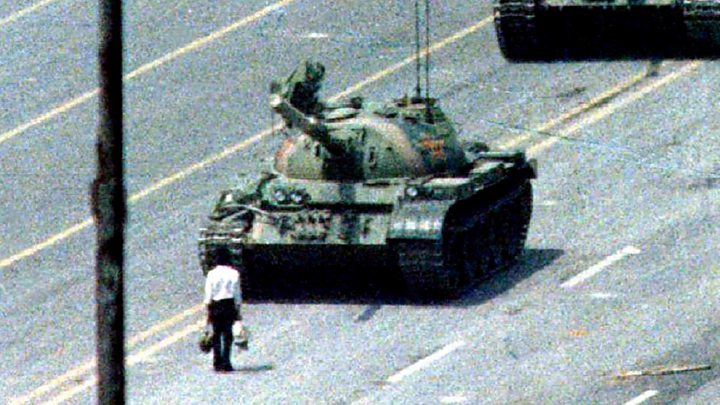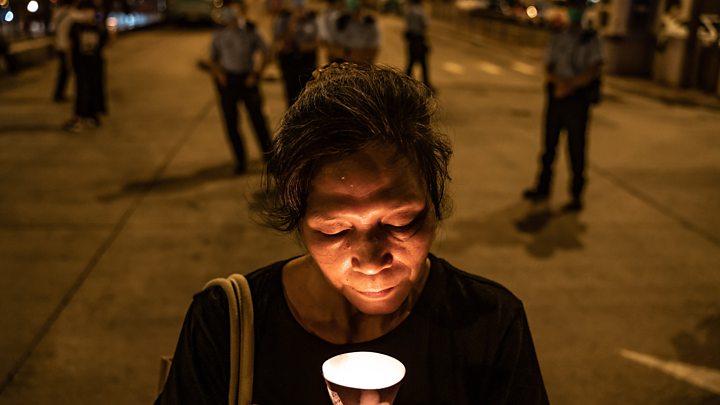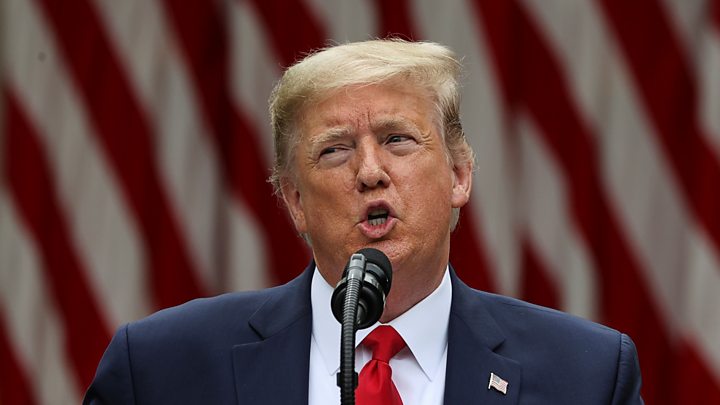Thousands of demonstrators in Hong Kong have defied a ban to stage a mass vigil in memory of the victims of the 1989 Tiananmen Square crackdown in Beijing.
Officers erected barricades around the city's Victoria Park, but some pro-democracy protesters knocked them down and held candlelit gatherings.
Police banned the vigil this year, citing coronavirus measures.
Earlier, lawmakers approved a controversial bill making it a crime to insult China's national anthem.
Ahead of the vote, two legislators were taken away by security guards after throwing a foul-smelling liquid on to the chamber floor.
They said they were protesting against China's growing control over Hong Kong, and also marking the Tiananmen Square anniversary.
The latest events come as the Chinese government is drawing up a new security law for Hong Kong, a move that threatens to raise tensions even further.
Why was the Tiananmen vigil banned?
Hong Kong and Macau are the only parts of China that have been allowed to mark the killings.
An annual vigil has been held in Hong Kong since 1990. On the mainland, references to the crackdown are banned, and the government mentions it rarely - if at all.
On 4 June 1989, troops and tanks opened fire on pro-democracy protesters in Beijing - estimates of the dead vary from a few hundred to several thousand.

Media playback is unsupported on your device
Tens of thousands of people normally mark the anniversary in Hong Kong, but police told local media that 3,000 riot officers would be deployed to stop smaller or impromptu commemorations.
At Victoria Park, one 61-year-old observing the anniversary told Reuters he was not afraid of being arrested.
"They can't arrest us all. This is something I can't forget. We must come here every year, even if I might be the last person who comes here," he said.
Candlelit vigils are also taking place in other parts of Hong Kong. In Mong Kok district, Brenda Hui held a white battery-illuminated umbrella that read "Never Forget June 4".
"We are afraid this will be the last time we can have a ceremony but Hong Kongers will always remember what happened on June 4," she said.

Media playback is unsupported on your device
The Hong Kong Alliance - which organises the annual vigil - said earlier it would to send delegates to Victoria Park in small groups that comply with social distancing rules.
Groups of up to eight are allowed to gather in Hong Kong under the territory's virus rules. But police sources told the South China Morning Post that if different groups gathered for a "common purpose", they would be moved on.
Some pro-democracy activists marked the anniversary outside a Hong Kong prison on Wednesday evening.
What is the national anthem bill?
The new law carries penalties of steep fines and up to three years in prison for anyone who shows disrespect to China's national anthem, the March of the Volunteers.
It also requires that schoolchildren in the territory be taught the anthem and its history.
Many in Hong Kong see it as another move by Beijing to impose its will and weaken the region's "one country, two systems" policy.
The bill was passed by 41 votes to one in the Legislative Council - Hong Kong's parliament - on Thursday, despite attempts by opposition members to disrupt it. Pro-democracy legislators abstained from voting, the South China Morning Post reported.
In recent years, the Chinese anthem has frequently been booed before matches involving the Hong Kong football team. Many fans have instead sung Glory to Hong Kong, which has become a rallying cry for pro-democracy activists.
Media playback is unsupported on your device
What is the proposed security law?
The Chinese government wants a new security law for Hong Kong, which would make it a crime to undermine Beijing's authority.
The law could also see China installing its own security agencies in the city for the first time.

Media playback is unsupported on your device
Critics fear the law would further erode Hong Kong's freedoms.
They also fear the bill could mean no more Tiananmen Square vigils in Hong Kong - even after the virus threat has eased.
The draft law was passed by China's rubber-stamp parliament, the National People's Congress, and is expected to come into force by September.
The proposal sparked renewed protests in Hong Kong. When the government last tried to introduce a national security law in 2003, it backed down after public anger.
https://news.google.com/__i/rss/rd/articles/CBMiNGh0dHBzOi8vd3d3LmJiYy5jby51ay9uZXdzL3dvcmxkLWFzaWEtY2hpbmEtNTI5MjAwODPSAThodHRwczovL3d3dy5iYmMuY28udWsvbmV3cy9hbXAvd29ybGQtYXNpYS1jaGluYS01MjkyMDA4Mw?oc=5
2020-06-04 13:05:58Z
52780831505950
Tidak ada komentar:
Posting Komentar